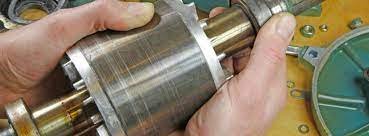Asst. Mechanic – Bearing Maintenance

Introduction:
In the realm of machinery, bearings serve as crucial components that facilitate smooth rotation and movement, reducing friction and enabling efficient operation. However, like any mechanical part, bearings require regular maintenance to ensure optimal performance and longevity. This is where the role of an Assistant Mechanic specialized in bearing maintenance becomes paramount. In this article, we delve into the responsibilities, skills, and importance of an Assistant Mechanic in maintaining bearings within various industrial settings.
Understanding Bearings:
Before delving into the intricacies of bearing maintenance, it’s essential to understand the fundamental role bearings play in machinery. Bearings are mechanical components that enable rotational or linear movement while reducing friction between moving parts. They are found in various applications, from automotive engines to industrial machinery, ensuring smooth operation and prolonging the life of rotating equipment.
Responsibilities of an Assistant Mechanic in Bearing Maintenance:
- Inspection: Assistant Mechanics are tasked with inspecting bearings regularly to identify signs of wear, damage, or misalignment. This involves visually examining bearings and using specialized tools such as vibration analyzers and thermography equipment to detect potential issues.
- Lubrication: Proper lubrication is critical for bearing performance and longevity. Assistant Mechanics are responsible for ensuring that bearings are adequately lubricated with the appropriate type and amount of lubricant. This may involve replenishing lubricants, greasing bearings, or implementing automated lubrication systems.
- Replacement: When bearings reach the end of their service life or incur significant damage, Assistant Mechanics are responsible for replacing them promptly. This involves removing the old bearings, selecting suitable replacements, and installing them correctly, ensuring proper alignment and fit.
- Alignment: Misalignment can lead to premature bearing failure and machinery downtime. Assistant Mechanics play a crucial role in aligning bearings accurately, either during installation or as part of routine maintenance procedures. They utilize precision alignment tools and techniques to achieve optimal alignment, minimizing wear and maximizing bearing lifespan.
- Troubleshooting: Assistant Mechanics must troubleshoot bearing-related issues efficiently to minimize downtime and prevent costly repairs. This requires a thorough understanding of bearing principles, diagnostic techniques, and problem-solving skills to identify and address issues promptly.
- Documentation: Maintaining accurate records of bearing maintenance activities is essential for tracking performance, scheduling future maintenance tasks, and ensuring compliance with regulatory requirements. Assistant Mechanics are responsible for documenting maintenance procedures, inspections, repairs, and replacement activities meticulously.
Skills Required for Bearing Maintenance:
- Technical Expertise: Assistant Mechanics must possess a solid understanding of bearing principles, types, and applications. They should be familiar with various bearing materials, lubrication methods, and maintenance techniques to perform their duties effectively.
- Attention to Detail: Bearing maintenance requires meticulous attention to detail to detect subtle signs of wear or damage that could compromise performance. Assistant Mechanics must be thorough in their inspections and precise in their maintenance procedures to ensure optimal bearing performance.
- Problem-Solving Abilities: Bearing-related issues can be complex and multifaceted, requiring Assistant Mechanics to troubleshoot effectively and implement appropriate solutions. They should possess strong problem-solving skills and the ability to diagnose and address issues promptly to minimize downtime.
- Mechanical Aptitude: A strong mechanical aptitude is essential for Assistant Mechanics to understand the intricacies of bearing systems and perform maintenance tasks accurately. They should be comfortable using hand and power tools, reading technical manuals, and interpreting engineering drawings.
- Communication Skills: Effective communication is crucial for Assistant Mechanics to collaborate with other team members, convey maintenance instructions, and report findings accurately. They should be able to communicate technical information clearly and concisely, both verbally and in writing.
Importance of Bearing Maintenance:
Proper bearing maintenance is essential for ensuring the reliable operation of machinery and equipment across various industries. Here’s why it’s crucial:

- Minimizes Downtime: Regular bearing maintenance helps prevent unexpected failures and breakdowns, minimizing downtime and production losses.
- Extends Equipment Lifespan: Well-maintained bearings last longer and perform more reliably, prolonging the lifespan of machinery and equipment.
- Improves Efficiency: Properly maintained bearings operate more efficiently, reducing energy consumption and enhancing overall equipment performance.
- Enhances Safety: Faulty bearings pose safety risks to personnel and equipment. By ensuring bearings are in good condition, maintenance helps create a safer working environment.
Conclusion:
Assistant Mechanics specializing in bearing maintenance play a vital role in ensuring the smooth operation of machinery and equipment across various industries. By conducting regular inspections, performing maintenance tasks, and troubleshooting issues effectively, they help minimize downtime, extend equipment lifespan, and optimize operational efficiency. With their technical expertise, attention to detail, and problem-solving abilities, Assistant Mechanics contribute significantly to the reliability and safety of industrial processes reliant on bearings.
